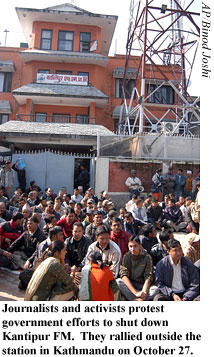New York, November 11, 2005 —Nepal’s Supreme Court today rejected media petitions for the suspension of a draconian new law that bans FM radio news broadcasts and curbs critical newspaper coverage. The Supreme Court is expected to issue a final ruling on the constitutionality of the law, which the government issued in October, in the next few weeks, according to local sources.
Nine media groups had filed three separate petitions seeking an interim injunction against the government ordinance. The petitions followed a police raid on the radio station owned by the country’s largest media group, Kantipur, on October 21. An influential voice of the independent media, Kantipur was the first target of the ordinance. Police seized transmitter equipment in retaliation for Kantipur FM’s news broadcasts. Kantipur FM 96.1 suspended its news program, Kantipur Diary, today following the Supreme Court decision.
“King Gyanendra promised that his draconian measures against the press would be temporary. But this latest decision opens the door to permanent censorship,” said Ann Cooper, Executive Director of the Committee to Protect Journalists. “If the Supreme Court does not protect the basic right to freedom of expression enshrined in Nepal’s constitution, then journalists are at the mercy of the King.”
Journalists’ groups including the Federation of Nepalese Journalists urged other private FM radio stations to ignore the today’s Supreme Court ruling and continue to broadcast news. Journalists said they planned street protests against today’s decision.
Besides the news broadcast ban, the ordinance limits the print media’s ability to report critically on government, the royal family, and security forces. It codifies a prohibition on news content that “causes hatred or disrespect” to the king and members of the royal family, according to news reports. It also bans news “promoting terrorists, terrorism and destructive activities” and increases the penalty for defamation. Journalists can now be jailed for up to two years for criticizing the government, The Himalayan Times reported.
The press has been under attack from the government since King Gyanendra seized absolute power in a coup on February 1. Emergency measures instituted at the time shut down the independent press and stopped private FM radio stations from broadcasting news, a primary source of information for many Nepalese. At the time, the king promised international allies and donors that actions against the press were temporary measures intended to aid in the fight against a Maoist insurgency.
![]()
